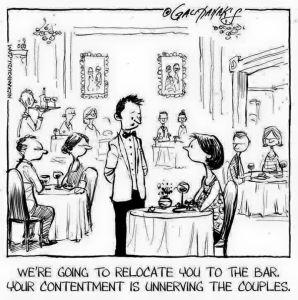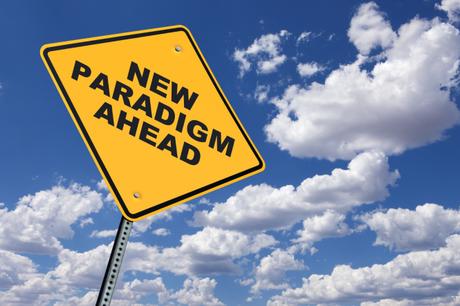A lot has been said, in Poly literature, about something called Couple Privilege, and about something called Hierarchy. The two are commonly perceived to be a package deal, and certainly the way many people talk about them, that’s understandable.
However, I’ve noticed a concerning trend to consider them as the same thing; I recently read a lovely piece by a married woman about how she and her husband didn’t have couple privilege because they didn’t have a hierarchical relationship. I fully respect the place she was coming from, but I felt inspired to examine these concepts again for myself, as something just felt off for me.
I’ll be honest- the first time I hear about Couple Privilege, I tuned out. I just didn’t get it. It’s only in the last few months, as I’ve grown deeper into a relationship with a married man, as I’ve been studying relationship and intimacy from a counsellor’s perspective, and as I’ve seen this topic come up multiple times in the Solo Polyamory group on Facebook, that I feel I’ve started to really grok what this is all about.
What Couple Privilege Is:
The culturally entrenched priority, and measure of value, given to couples by society, both in public perception of them, and the legal status of them.
 Couple Privilege doesn’t just refer to the legal rights of married or common law partnerships. It goes beyond the right to visit your partner in the hospital, or be legally included in their inheritance even if they didn’t leave a will. It’s more than the financial benefits of being able to file your taxes together. It’s something that is also entrenched in the way that we are taught to see couples. Successful coupling is seen as a milestone in the process of being “grown up”.
Couple Privilege doesn’t just refer to the legal rights of married or common law partnerships. It goes beyond the right to visit your partner in the hospital, or be legally included in their inheritance even if they didn’t leave a will. It’s more than the financial benefits of being able to file your taxes together. It’s something that is also entrenched in the way that we are taught to see couples. Successful coupling is seen as a milestone in the process of being “grown up”.
In short, it’s what gay and lesbian couples have been fighting to attain the right to have in the USA and many other countries around the world.
What Couple Privilege Is Not:
Couple Privilege is not something that couples can opt in or out of. Just as you cannot loose male privilege whilst being a man, or loose white privilege when you get a summer tan, you cannot select out of couple privilege if you are coupled.
Couple Privilege is not the same as hierarchy, even though the two are often conflated. They are two separate, often co-existing, phenomenon.
What Hierarchy is:
The prioritising of one relationship over another.

If you have a child who you are responsible for, they become the primary focus in your life. If you have a spouse or partner you share financial commitment with, they will be higher a priority than a partner who you don’t live with, have children with, or share finances with. Plain and simple. Hierarchy is implicit, I believe, when you move in with someone, marry someone, or have a child with them.
What Hierarchy Is Not:
Though often considered to go hand in hand, Hierarchy does not mean Veto Power.
Veto Power is a construct that many therapists have recommended to couples opening up their relationship. It is when your spouse can decide you cannot have a relationship with someone else, regardless of your own feelings and desires, because they have said so. Veto Power is an approach to maintaining boundaries and preserving the primary relationship, but I think there are ways to create relationship rules and sculpt boundaries that are far more consensual for everyone involved, including the secondary, non coupling partners.
I’ve met many couples with relationship rules, and have often been informed of their rules very clearly before engaging in anything relationship or intimacy wise with them, yet I have not encountered many couples with Veto Power. Maybe that’s a statistical blip, or perhaps Veto Power is not as prevalent as it once was.
Wait- Is There Such A Thing As Solo Privilege?
 As Western society experiences a surge in popularity of individualism and celebration of the Solo individual, there is a romanticism about the freedom of the Solo Person that arguably gives them some privileges couples do not enjoy. In the polyamorous world, a solo person can “pass” or even be out publicly far more readily than someone who is coupled.
As Western society experiences a surge in popularity of individualism and celebration of the Solo individual, there is a romanticism about the freedom of the Solo Person that arguably gives them some privileges couples do not enjoy. In the polyamorous world, a solo person can “pass” or even be out publicly far more readily than someone who is coupled.
Arguably, this is actually because of Couple Privilege: we value the unit of the couple so much, that anything that challenges that would threaten the ‘fabric of society, and so it makes it hard for couples to come out. And, on the flip side of that, a person who is solo is simply seen as “not coupled yet”, and so their non-monogamous relationships can be more readily dismissed as “Oh they just haven’t found the one yet!”
Single, non-coupled people, can experience a struggle to be recognised as successful and competent adults by their families, friends, and work peers. They can also have a more challenging time financially, supporting a home on a single income and receiving none of the tax benefits that couples do.
How Couple Privilege and Hierarchy Are Different:
1. You don’t have to be coupled to have Hierarchy. For many solo people there is a hierarchy too- its our self-relationship first.
2. Couple Privilege is something awarded you and your coupling partner by Society. You have no choice about this. The moment you display signs of being a couple, you have attained a new level of privilege. What you do have free choice over, is how to react and relate to your own privilege.
Aggie Sez, the author of Solo Poly, has written (in an unpublished comment to an article conflating Couple Privilege and Hierarchy):
“Relationship hierarchy boils down to default, competitive decision making. That is, where people in separate but overlapping relationships have differing needs and wishes, this gets framed as a competition to be won, or as a potential threat to be controlled. It’s mostly a foregone conclusion who will “win” based on how the people/relationships involved are “ranked” — typically according to the nature or duration of those relationships. More life-entwined relationships (such as a cohabitating legal marriage) usually tend to get higher rank. But you could have a poly network where no one is legally married or living together, yet still practice hierarchy among the various relationships involved (though non of those relationships would have social couple privilege).”
So, Hierarchy is something you have more of a choice about, and it feeds into your decision making process. Hierarchy is implicit in most circumstances, but in different ways. It is really only limited to one linear measure if you’re attached to the rules of monogamy. For example, a relationship anarchist might have four different relationships that take priority in different ways at different times: one for longevity, one for cohabitating, one that is long distance (when they come into town), and one for it’s newness and novelty.

Being single in a sea of couples is not always easy.
Okay, So Now What?
What you can do, if you are part of a Couple, is be aware of both the legal benefits and the social status advantage you enjoy through your relationship, and ‘check your privilege’. What does that look like? Well, you can consider, where do you benefit from being coupled, in a way that your solo friends don’t? Knowing that, how can you be conscious and aware of this and demonstrate this in your actions. You can be an ally to people who are Solo, and be an ally to the other partners your partner has.
Like with Couple Privilege, if you are in a relationship that has some inherent Hierarchy (such as living close versus living long distance, or working together versus not) you can still mitigate the aspects of Hierarchy you are uncomfortable with. You can work to establish an egalitarian base for your relationships, splitting time equally, sharing calendars with all partners, actively working towards more balance in your relationship. For example, if you are uncomfortable with your nesting partner taking priority over your non-nesting partner, you need to consider how to balance this. You could arrange sleepovers when your live-in partner has a date at one of their partner’s homes.
It’s also important, even for non-coupled people, to be aware of how they play into the scripts around couple privilege. When meeting two people who appear to be a couple, do you ever make assumptions about them, and their relationship style?
This approach to combating both the effects of Couple Privilege and Hierarchy is the basis of many of the writings of Franklin Veaux, the book More Than Two, and indeed, much of what I think of as the “second wave” of literature on polyamory. It is an approach that generally considers Couple Privilege and Hierarchy to be constructs that do more harm than good in practices of honest non monogamy.

We are now experiencing an emerging “third wave” of poly theory. Drawing from the principles of Relationship Anarchy (‘RA’) of love, trust, and customizing your commitments, and with a focus on healthy self-relationships, couples are emerging who have firmly eschewed as much of their Couple Privilege as they can whilst still remaining coupled, and Solos are discovering ways of having aspects of coupled relationships, enjoying some of the societal endowed privileges whilst abstaining from the legal and community restrictions associated with it. With less focus on trying to ‘balance the scales’ of Privilege and Hierarchy, the RA-inclined non monogamists and polyamorists tend to not fight the aspects of each construct, and rather, they embrace them. Intimate networks, that can include couples, singles, triads, friendships, and long term relationships unbound by rules, are an emerging frontier in radical relationshiping.
I definitely fall into this latter category; my polycule is a social network of its own, with many diverse approaches to non monogamy represented within it, varying relationship rules, agreements, and structures. We are in exciting new territory of discovering what long term non-monogamy, completely outside of the monogamy paradigm, might look like. And I find that quite exciting.

